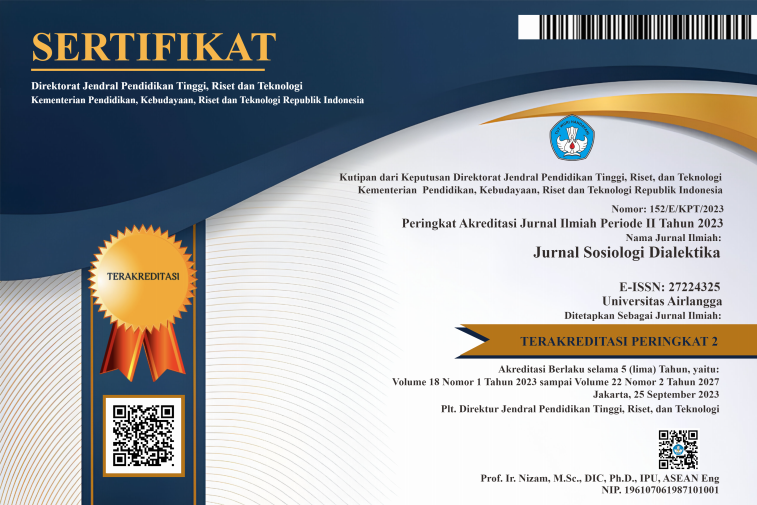Political economy of farmer group empowerment policy to support the achievement of SDGs
Downloads
The policy of forming and strengthening farmer groups is not a practical solution for advancing agriculture/improving farmer welfare. Strengthening institutions and empowering farmer groups is not merely a matter of agricultural economics, but of political economy. The problem is, there are many technical and non-technical obstacles that place farmer groups as actors in sustainable agricultural policy and development in accordance with SDGs #2. This study discusses the complexity of agricultural problems in Watu Lanur Village, Poco Ranakan Sub-District, East Nusa Tenggara. The less than optimal natural carrying capacity, the socio-economic conditions of rain-fed farmers and the lack of intensive assistance from the government are among the causes. Empowerment of farmer groups is hampered by subsistence ethics and socio-cultural issues (customs/traditions). This study uses qualitative methods with data collection techniques through in-depth interviews and observations of farmer groups. This study shows that the community is trying to empower itself by helping farmer groups. However, in the process, technical and non-technical obstacles are still found that do not support the community's innovation movement. The conclusion of this study is that farmer group institutions are weakened and less oriented towards implementing sustainable agriculture as a result of the establishment of farmer groups simply to fulfill formal aspects of empowering farmers in order to improve farmer welfare and less use of local knowledge in empowering farmer groups.
Anil B, Tonts M, & Siddique KH (2015) Strengthening the performance of farming system groups: Perspectives from a communities of practice framework application. International Journal of Sustainable Development & World Ecology 22 (3):219-230. https://doi.org/10.1080/13504509.2014.1003153.
Bingen RJ & Simpson BM (2015) Farmer organizations and modernizing extension and advisory services. MEAS Discussion Paper Series on Good Practices and Best Fit Approaches in Extension and Advisory Service Provision. East Lansing: Michigan State University.
BPS (2022) Kabupaten Manggarai Timur dalam angka 2022. [Accessed 7 March 2023]. https://manggaraitimurkab.bps.go.id.
Bunch R (1991) People centred agricultural development. In: Haverkort B, Kamp J, & Waters-Bayer A(ed). Joining Farmers'Experiences. London: IT Publications.
Chesoli CW (2013) Types of capacity building activities for improved market participation by farmer groups in Turbo, Kenya. Journal of Emerging Trends in Economics and Management Sciences (JETEMS) 4 (4):377-380. https://hdl.handle.net/10520/EJC142052.
CNN Indonesia (2023) Daftar terbaru 5 provinsi termiskin di Indonesia. CNN Indonesia, 17 January. [Accessed 26 February 2024].https://www.cnnindonesia.com/ekonomi/20230117184306-92-901639/daftar-terbaru-5-provinsi-termiskin-di-indonesia.
Drèze J & Sen A (1989) Hunger and Public Action. Oxford: Clarendon Press.
FAO (2012) The state of food insecurity in the world. Economic growth is necessary but not sufficient to accelerate reduction of hunger and Malnutrition. Rome: Food and Agriculture Organization of the United Nations.
FAO (2020) Empowering farmers and their organizations through the creation of social capital - Bond learning guide for trainers. Rome: Food and Agriculture Organization of the United Nations. https://doi.org/10.4060/cb1423en.
Frese M & Gielnik MM (2014) The psychology of entrepreneurship. Annual Review of Organizational Psychology and Organizational Behavior 1: 413-438. https://doi.org/10.1146/annurevorgpsych-031413-091326.
Gassner A, Harris D, Mausch K, Terheggen A, Lopes C, Finlayson RF, & Dobie P (2019) Poverty eradication and food security through agriculture in Africa: Rethinking objectives and entry points. Outlook on Agriculture 48 (4):309-315. http://doi 10.1088/1742-6596/1155/1/012004.
Hamilton W, Bosworth G, & Ruto E (2015) Entrepreneurial younger farmers and the "Young farmer problem” in England. Agriculture & Forestry 61 (4):61-69.
Haverkort B (1991) Farmers'experiments and participatory technology development. In: Haverkort B, Kamp J, & Waters-Bayer A (ed). Joining Farmers'Experiences. London: IT Publications.
Ife J (2002) Community Development, Commuity Base Alternatives in An Age of Globalisation. 2nd Edition. Australia: Pearson Education Australia.
Jonfa E & Waters-Bayer A (2005) Unlocking Farmers' Potential. Enabling: Institutionalizing Farmer Participatory Research and Extension in Southern Ethiopia. Project Experience Series 2. https://www.fao.org/3/I8260EN/i8260en.pdf.
Khanal NP & Maharjan KL (2015) Community Seed Production Sustainability in Rice-Wheat Farming. Tokyo: Springer.
Koch M & Buch-Hansen H (2021) In search of a political economy of the postgrowth era. Globalizations 18 (7):1219-1229.https://doi.org/10.1080/14747731.2020.1807837.
Listiana I, Efendi I, Mutolib A, & Rahmat A (2019) The behavior of extension agents in utilizing information and technology to improve the performance of extension agents in Lampung Province. In Journal of Physics: Conference Series 1155 (1):012004. https://doi.org/10.1088/1742-6596/1155/1/012004.
Lon YS & Widyawati F (2020) Mbaru Gendang, Rumah Adat Manggarai Flores: Eksistensi, Sejarah, dan Transformasinya. Sleman: Kanisius.
Markelova H, Meinzen-Dick R, Hellin J, & Dohrn S (2009) Collective action for smallholder market access. Food Policy 34 (1):1-7. https://doi.org/10.1016/j.foodpol.2008.10.001.
McGinty S (2003) The literature and theories behind community capacitybuilding. In: Sharing Success: an Indigenous perspective. VIC, Australia: Common Ground Publishing.
Merriam SB & Tisdell EJ (2016) Qualitative Research: A Guide to Design and Implementation. New York: John Wiley & Sons.
Muhammad N (2023) Provinsi dengan produksi padi terbesar nasional 2023, Jawa Timur juaranya. Databoks, 18 October. [Accessed 30 October 2023]. https://databoks.katadata.co.id/datapublish/2023/10/18/provinsi-dengan-produksi-padi-terbesar-nasional-2023-jawa-timurjuaranya/.
Nazaruddin N & Anwarudin O (2019) Pengaruh penguatan kelompok tani terhadap partisipasi dan motivasi pemuda tani pada usaha pertanian di Leuwiliang, Bogor. Jurnal Agribisnis Terpadu12 (1):1-14. https://jurnal.untirta.ac.id/index.php/jat/article/view/5530/3995.
Neza BN, Higiro J, Mwangi LW, & Ochatum N (2021) Institutionalizing farmer field schools. The Food and Agriculture Organization of the United Nations and the International Food Policy Research Institute Rome.
Nourani V, Maertens A, & Michelson H (2021) Public good provision and democracy: Evidence from an experiment with farmer groups In Malawi. World Development 145. https://doi.org/10.1016/j.worlddev.2021.105507.
Nwankpa NN (2017) Sustainable agricultural development in Nigeria: A way out of hunger and poverty. European Journal of Sustainable Development 6 (4):175-184. https://doi.org/10.14207/ejsd.2017.v6n4p175.
Oxby C (1983) Farmer groups in rural areas of the third world. Community Development Journal 18 (1):50-59. https://www.jstor.org/stable/44256167.
Prasetyono DW (2019) Pengembangan kapasitas kelembagaan kelompok tani sebagai pilar pemberdayaan petani. In: Prosiding PKM CSR-Konferensi Nasional Pengabdian Kepada Masyarakat dan Coorporate Social Responsibility 2. Peran Perguruan Tinggi dan Dunia Usaha dalam Mempersiapkan Masyarakat Menghadapi Era Industri 4.0.
Rahmadanih, Bulkis S, Arsyad M, Amrullah A, & Viantika NM (2018) Role of farmer group institutions in increasing farm production and household food security. In: IOP Conference Series: Earth and Environmental Science 157 (1):012062. Bristol: IOP Publishing. https://doi.org/10.1088/1755-1315/157/1/012062.
Rizaty MA (2021) Rasio penderita gizi buruk di NTT tertinggi nasional. Databoks, 18 January. [Accessed 26 February 2024]. https://databoks.katadata.co.id/datapublish/2021/01/18/rasio-penderita-giziburuk-di-ntt-tertinggi-nasional.
Roller MR & Lavrakas PJ (2015) Applied Qualitative Research Design: A Total Quality Framework Approach. New York: Guilford Press.
Ropo R (2023) PPL dan ketua kelompok tani Manggarai Timur dilatih budidaya jagung model GAP.Tribunnews. 30 November. [Accessed 29 October 2023].https://flores.tribunnews.com/2023/11/30/ppl-dan-ketua-kelompok-tani-manggarai-timur-dilatih-budidaya-jagung-model-gap.
Runggat F (2022) Alokasi pupuk subsidi di Matim kurang, begini penjelasan distributor. Timexkupang, 7 February. [Accessed 10 July 2023]. https://timexkupang.fajar.co.id/2022/02/07/alokasi-pupuksubsidi-di-matim-kurang-begini-penjelasan-distributor-yohanes-suherman/.
Sasmi M, Agustar A, Syarfi IW, & Hasnah (2023). Empowerment of Farmer Institutions in Improving Farmer's Bargaining Position. IOP Conf. Series: Earth and Environmental Science 1177 (2023) 012001. Bristol: IOP Publishing. http://doi:10.1088/1755-1315/1177/1/012001.
Scott JC (1976) The Moral Economy of the Peasant: Rebellion and Subsistence in Southeast Asia. New Haven: Yale University Press.
Strauss A & Corbin J (1998) Basics of Qualitative Research: Techniques and Procedures for Developing Grounded Theory. 2nd. Thousand Oaks, CA: Sage Publications.
World Bank (2007) World development report 2008: Agriculture for development. World Bank. [Accessed 7 June 2023].http://hdl.handle.net/10986/5990.

This work is licensed under a Creative Commons Attribution-NonCommercial-ShareAlike 4.0 International License.
1. Copyright of this journal is possession of Editorial Board and Journal Manager, by the knowledge of author, whilst the moral right of the publication belongs to the author.
2. Legal formal aspect of journal publication accessibility refers to Creative Commons Attribution-NonCommercial-ShareAlike (CC BY-NC-SA), implies that publication can be used for non-commercial purposes in its original form (cannot be modified).
3. Every publications (printed/electronic) are open access for educational purposes, research, and library. Other that the aims mentioned above, editorial board is not responsible for copyright violation.















